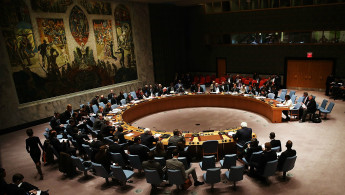Syria talks to start in Geneva without key figures
United Nations-mediated peace talks aimed at ending Syria's conflict are scheduled to kick off on Friday, but the absence of key opposition members threatens to derail the biggest diplomatic push yet to resolve the nearly five-year-old civil war.
The Saudi-backed High Negotiations Committee, which met in Riyadh on Thursday, said the opposition group would not attend the negotiations in Geneva until an agreement is reached on aid entering besieged towns.
The Committee was formed in December when the main Syrian political opposition and armed factions came together in the Saudi Arabian capital for an unprecedented bid at unity, after months of Saudi efforts.
UN envoy Staffan de Mistura, in a video message to the Syrian people on Thursday, said the talks could be their country's last chance for peace after a civil war that has seen more than 260,000 people killed and forced millions from their homes.
He said that after several stalled peace processes, the Geneva talks "cannot fail".
Riad Hijab, coordinator of the High Negotiations Committee, said that aid access was a precondition of the group attending.
"Tomorrow we won't be in Geneva. We could go there, but we will not enter the negotiating room if our demands aren't met," he told al-Arabiya television.
A senior delegate of the High Negotiations Committee told AFP that a decision was expected on Friday on whether to attend the UN-brokered talks.
A spokeswoman for the UN talks, Khawla Mattar, said that no postponement was planned.
Western diplomats have piled pressure on the opposition to participate in the negotiations, which would be only the second dialogue between Syrians since the start of the conflict.
The Committee has asked for "clarifications" after the UN issued invitations to other opposition figures, and wants assurances from the international community that it will move to end regime attacks on civilians and allow humanitarian aid.
France-based Middle East analyst Agnes Levallois said the opposition was growing increasingly frustrated that the question of President Bashar al-Assad's fate, a key stumbling block in previous talks, was being put off.
"Assad is feeling stronger and stronger so is being inflexible," she said.
Government forces have made major inroads into opposition-held territory since Russia starting backing Assad with airstrikes in September.
Haytham Manna, a longstanding opposition figure who is co-chair of the political wing of a Kurdish-Arab alliance, told AFP in Geneva he did not expect talks to begin until Monday.
The talks are part of a UN-backed plan, agreed by top diplomats last year in Vienna, that envisages negotiations followed by a transitional government, a new constitution and elections within 18 months.
French President Francois Hollande called for negotiations to start as soon as possible.
"We urgently need to put in place humanitarian measures and negotiate a political transition," Hollande said at a joint press conference with Iranian President Hassan Rouhani.
The United States, while expressing sympathy for the rebel demands for aid, also urged the Syrian opposition to attend the talks.
Russia said on Thursday it wanted another meeting of world powers on Syria in Munich on February 11, when the first round of the Geneva talks could still be taking place.





 Follow the Middle East's top stories in English at The New Arab on Google News
Follow the Middle East's top stories in English at The New Arab on Google News
![Israeli forces ordered bombed Gaza's Jabalia, ordering residents to leave [Getty]](/sites/default/files/styles/image_330x185/public/2176418030.jpeg?h=a5f2f23a&itok=_YGZaP1z)

